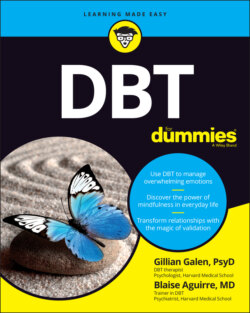Читать книгу DBT For Dummies - Gillian Galen - Страница 45
Questioning Your First Reaction
ОглавлениеOur first reaction doesn’t always come from a wise place; instead, it can be powerfully driven by emotions. In DBT, we say that these reactions come from your emotion mind. When you’re in this state of mind, you see the world and react to it based solely on how you feel in the moment, with little consideration about the facts of the situation. When first reactions are problematic, they are driven too much by how we feel and lead to an equally problematic sense of certainty that we are right or that there is only one possible option or perspective. We can forget that there may be other possibilities, and our thinking can become rigid. Along with this chapter, the mindfulness skills discussed in Chapter 9 will help you become more aware of strong emotions, learn to step back, and more purposely (instead of reactively) move forward with broader awareness and curiosity.
Questioning your first reaction is a challenging and wonderful practice. When you do so, you’re more able to act with an open mind and in a way that is consistent with your values. The following sections discuss some important aspects of questioning your first reaction to a situation: realizing that it may be exaggerated, matching it to what’s in front of you, and stopping yourself from taking action.
It’s important to note that when you feel absolutely certain about something, you may be missing important information. That can be a helpful cue that you should consider other points of view.
